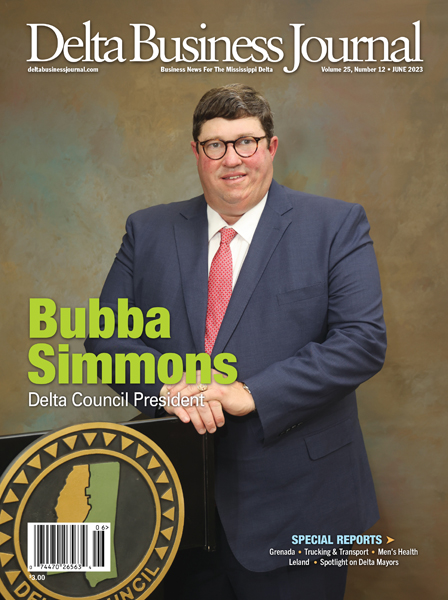Delta Council President
By Becky Gillette • Photography by Johnny Jennings
Bubba Simmons is the sixth-generation member of his family to farm in the Mississippi Delta. On his mother’s side, his great-great-great grandfather came to the Mississippi Delta in the 1871 before a lot of the Delta was even settled. Simmons, the new president of Delta Council, has traveled widely both in the U.S. and foreign countries in his work to promote the agriculture economy serving on the United Soybean Board and as immediate past chairman of the Mississippi Soybean Promotion Board.
“Anytime you travel and are exposed to people from different parts of the country and the world, you learn from them,” says Simmons. “With the United Soybean Board, it has been interesting to see where soybeans produced in the Mississippi Delta end up and what the end user thinks of your product. I think everyone is more concerned about where their food comes from. When people are feeding poultry and pork, they want to know the story of the food feeding those animals. There are other uses, as well, but one of the primary uses of soybean meal is for animal feed.”
Soybeans are the number one row crop commodity in Mississippi with annual sales more than $1 billion.
One thing Simmons has learned from his trips is that the Delta Council is a unique organization.
“Having traveled all over the country and all over the world, I’ve not yet experienced an organization like Delta Council that can pull together the leadership of the region and work to its benefit,” says Simmons. “I don’t think an organization like Delta Council exists in other areas of the country. Because the Delta is a very defined regional area, it helps make that possible. Delta Council addresses those issues like flooding that don’t have county lines or government boundaries.”
Delta Council was founded to address flood control, transportation and agriculture. Those were certainly major issues when the Delta Council was founded eighty-eight years ago and still are today. But today Delta Council has a broader focus.
“We want to support efforts to make improvements in all those areas and generally make the Delta a better place to live,” says Simmons. “Like all of rural America, we are experiencing depopulation. We have had to adjust and make some changes.”
For more than ten years, Simmons has been chairman of the Delta Council Advisory Research Committee. In that role, he worked with his alma mater, Mississippi State University, and with the USDA Agricultural Research Service (ARS) to address agriculture needs including investigating new herbicides to address weed control, the registration of new pesticides and efforts to conserve the Mississippi alluvial aquifer.
“Next to the land, groundwater is the most valuable resource in the Delta,” says Simmons.
Like many other Delta producers, the Simmons family used to grow a lot of cotton. But, cotton production has been on the decline in the South since the 1950s. Rice was important in his family in the past. But now, the number one most important crop for the Simmons and for most other producers in the Delta is soybeans.
To be a successful farmer today takes a great deal of multi-tasking. That was true in the past and perhaps even more true today with complicated technology, accounting, labor shortages and marketing challenges.
“Technology is changing so fast that it takes a lot of work and effort to keep up with it and understand how to use it,” says Simmons. “Everything we do we are collecting data, and incorporating it into the next application. No longer do you just go to the field and drive a tractor.”
He sees market volatility as an ever-present challenge. As farms have grown larger, which they have had to do to compete and take advantage of economies of scale, farmers have also assumed a lot more risk.
“There are so many things you can’t control like the weather that make it a risky environment,” says Simmons. “There are some great things about the lifestyle of farming. I’m out in the field today looking at beautiful green crops. You have a pretty good view out your office window, but don’t discount the risks it takes to participate and farm in this environment. I think that risk is greater than it has ever been. With speed and efficiency can also come risk. We can plant so many acres in a day that if you made an error, you made it on countless acres. Earlier if you made an error, you had time to make some corrections.”
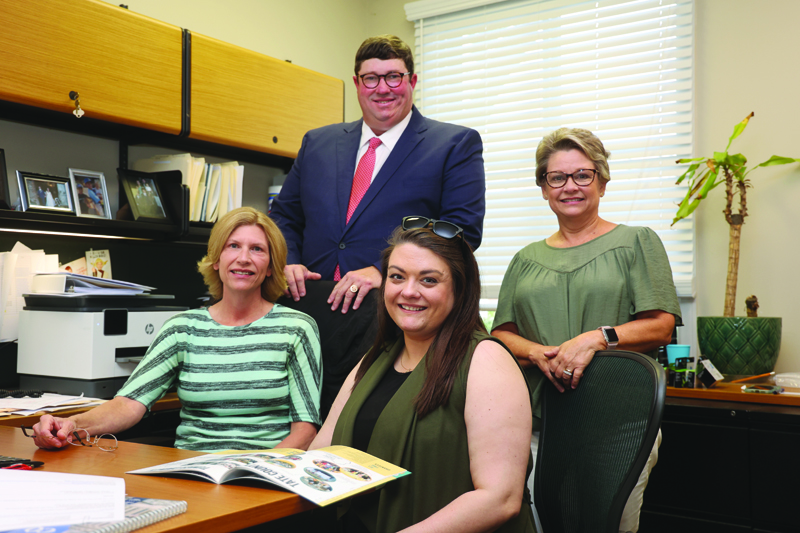
Simmons is a sixth generation Delta farmer and travels the world promoting Mississippi agriculture. Pictured with Simmons are Delta Council Staff members, Tina Manning, Mary Catherine Brooks and Shelia Smith.
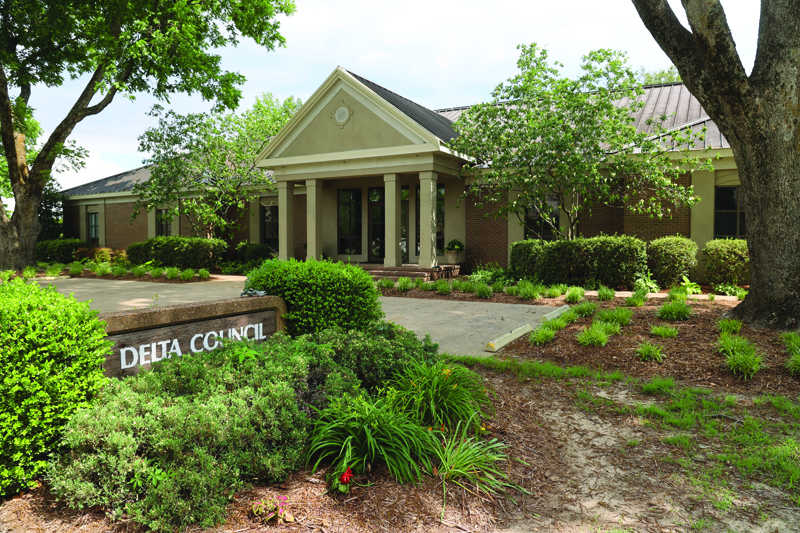
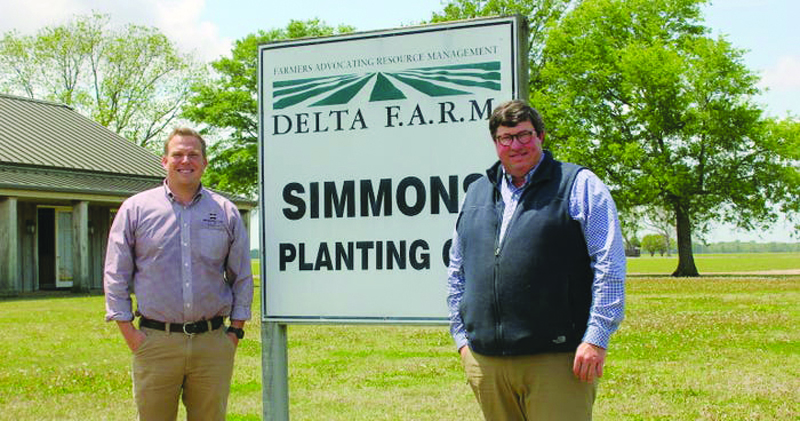
Simmons with Mississippi State Extension Specialist Dr. Drew Gholson.
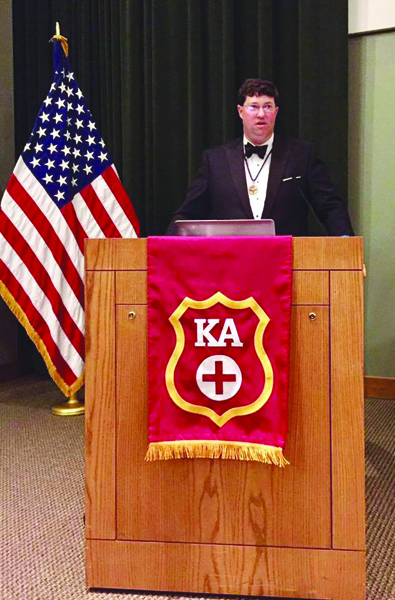
Simmons speaking to the Kappa Alpha Chapter at Baylor University in 2017
Technology innovation has meant efficiencies that can allow production of more crops with fewer workers.
“Probably the biggest change during my career has been the rapid development of technology to make us more profitable,” says Simmons. “Equipment is larger and more efficient, but it requires more management to get the most out of it. With the increasing size of equipment and more efficiency, we have a reduced number of workers on the farm but we also have less people living in this area. We have fewer employees on my farm today than twenty years ago and anticipate even fewer in the next twenty years. Skilled workers are needed to operate this sophisticated equipment, and they are hard to find. There is a labor shortage in the Delta and other parts of the country, as well.”
Simmons was born in Greenville in the same hospital where his mother was born. He grew up in Washington County and, for the most part, has been a resident of Washington County all his life. He graduated from Mississippi State University in 1998 with a degree in ag economics.
“College may not teach the nuts and bolts of farming, but you learn how to learn, and you learn how to grow up and be independent and accomplished,” says Simmons. “Without question, the contacts I made at MSU, which is a land-grant institution, and at the large ARS in Stoneville near my farm, helped me in my role as MSU advisory research chairman for Delta Council where my primary responsibility has been to be a conduit between growers and researchers.”
While he had always planned to return home to the family farm after college, he had an opportunity to go to work for his college fraternity, Kappa Alpha (KA), traveling the country promoting that organization for two years.
“It was a unique opportunity,” says Simmons. “It was before cell phones and GPS. I had to be on the road for months at a time, making my own schedule and setting up my own meetings. It was a good opportunity to grow up beyond college and do something else for a brief while before coming back to the farm. I continued my involvement with the organization and am about to complete my fourth and final year as president of KA. I’ve been on the national board for fifteen years.”
Heading KA with 133 chapters across the country during the pandemic was challenging because students were largely studying remotely. It was difficult to maintain membership and provide the normal fraternity experiences during those rocky times.
Walton Gresham, president of Gresham Petroleum Co. and secretary of Delta Terminal, Inc., says Simmons’ work with organizations ranging from KA to the United Soybean Board to the Mississippi Rice Council have prepared him well to lead Delta Council.
“Bubba is very smart,” says Gresham. “He has good decision-making leadership skills and has been a huge help to Delta Council these past few years. He has a great thought process for working through problems. Bubba is very deserving to lead Delta Council in the coming year as president.”
Woods Eastland, an attorney, agricultural producer and a former Delta Council President, says he expects Simmons will be one of the best people to head the organization ever.
“Bubba probably would have been chosen as Delta Council president earlier but he was serving as national president of KA and was active with the soybean boards,” says Eastland. “I think he knows Delta Council as well as anyone who has ever come into the office. He brings an outstanding mind and very good communication skills to the office, and is very successful with a big farming operation. He has done a lot of different good things for Delta Council through the years.”
One of the largest challenges in the Delta is flood control. But, flooding is not a new issue in the Delta.
“Flooding is what formed the Delta,” says Simmons. “It is the reason our soil is so fertile, and the most important resource we have today. As we transformed the land and altered drainage, mostly to improve drainage, we created some flooding issues. I am in favor of any effort to reduce flooding in the Delta, and support installation of Yazoo backwater pumps.”
Simmons also supports conservation of groundwater resources. Every well in the Mississippi Delta has a permit that dictates how much water can be withdrawn per year. Efforts have been made to irrigate most efficiently.
“Delta Council has worked with the Mississippi Department of Environmental Quality and other agencies to help conserve these resources that we have,” says Simmons.
Simmons says his strongest mentors include former Delta Council Executive Vice President Chip Morgan, who worked for Delta Council over forty years.
“Chip really inspired me to volunteer some time and get interested in Delta Council issues,” says Simmons. “Also, Frank Howell, my friend and neighbor, who is the current executive vice president of Delta Council, has also done a good job cultivating volunteer leadership by myself and others.”
Simmons’ hobbies include history and travel, particularly visiting the West for trout fishing. He is an avid catch-and-release fly fisherman who travels to the Bitterroot Valley near Missoula several times a year.

